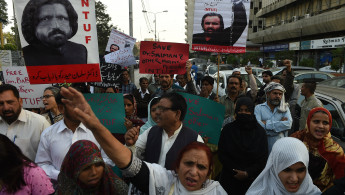HRW urges Pakistan to investigate abduction of bloggers
Human Rights Watch has urged Pakistan to investigate the apparent abductions of four bloggers who campaigned for human rights and religious freedom, saying their near simultaneous disappearances raised concerns of government involvement.
The statement on Tuesday came as activists prepared to hold protests throughout the country demanding the bloggers' release.
Salman Haider, a poet and academic, and bloggers Waqas Goraya, Aasim Saeed, and Ahmad Raza Naseer went missing from various cities between January 4 and January 7.
Goraya, an anthropologist who blogged on issues of religious freedom, and Saeed, a blogger and an administrator of a Facebook page hosting progressive views critical of religious extremists and Pakistan’s security policies, were reported missing from Wapda Town, Lahore, on January 4.
Haider, a poet and professor at Fatima Jinnah Women University, went missing on the evening of January 6. His wife received a text message telling her to pick Salman’s car from Koral Chowk, Islamabad. The family has not heard from Salman or the abductors since.
On January 7, unidentified men took away Naseer, a blogger running a Facebook page broadcasting secular, progressive views, from his family’s shop in Sheikhupura, Punjab.
 |
Rights groups say Pakistani activists and journalists find themselves routinely caught between the country's security establishment and militant groups including the Taliban |  |
Pakistan is routinely ranked among the world's most dangerous countries for journalists, and reporting critical of security policies controlled by the powerful military is considered a major red flag, with reporters at times detained, beaten and even killed.
Rights groups say Pakistani activists and journalists find themselves routinely caught between the country's security establishment and militant groups including the Taliban.
"The Pakistani government has an immediate obligation to locate the four missing human rights activists and act to ensure their safety," said Brad Adams, Asia director at Human Rights Watch.
"The nature of these apparent abductions puts the Nawaz Sharif government on notice that it can either be part of the solution or it will be held responsible for its role in the problem."
 |
The nature of these apparent abductions puts the Nawaz Sharif government on notice that it can either be part of the solution or it will be held responsible for its role in the problem |  |
The interior ministry said over the weekend it will investigate the disappearance of Haider, but made no reference to the others. A security source has denied intelligence services were involved in the disappearances.
Liberal activists were set to hold protests in major cities on Tuesday afternoon, using the hashtag #RecoverAllActivists to generate support on social media.
|
|
Dawn, the country's leading English-language daily, meanwhile issued a strongly-worded editorial.
"The sanitised language – 'missing persons', 'the disappeared', etc – cannot hide an ugly truth: the state of Pakistan continues to be suspected of involvement in the disappearance and illegal detentions of a range of private citizens," it said.
"It is simply not enough for government and police officials to claim that the disappearances are being investigated. Mr Haider and the other recently missing activists need to be returned to their families immediately."
In April 2015, prominent activist Sabeen Mahmud was killed by militants who said they carried out the attack because she promoted liberal, secular views.
In April 2014, unidentified gunmen attacked but failed to kill Hamid Mir, one of the country's most recognised TV anchors. His employer and his family later accused the director general of the powerful Inter-Service Intelligence agency of involvement.
"The government needs to reduce the insecurity faced by journalists and activists, which has a severe chilling effect on their work," Adams said. "This requires the government holding responsible the militants – and its own security agencies – that threaten and attack them."
Agencies contributed to this report





![Both Hamas and the Palestinian Authority welcomed the ICC arrest warrants [Getty]](/sites/default/files/styles/image_330x185/public/2024-11/GettyImages-2178351173.jpg?h=199d8c1f&itok=TV858iVg)

